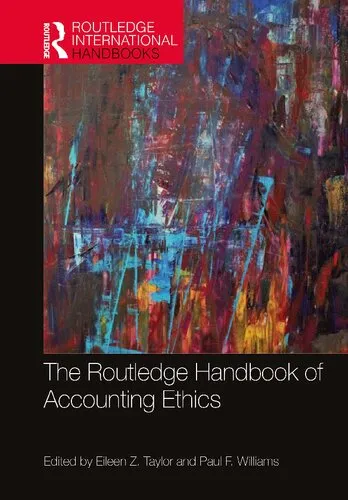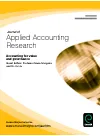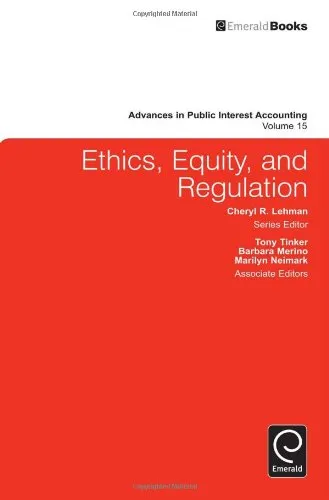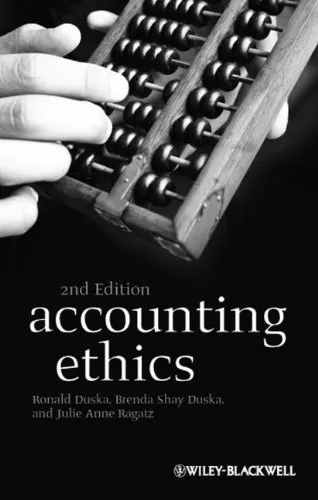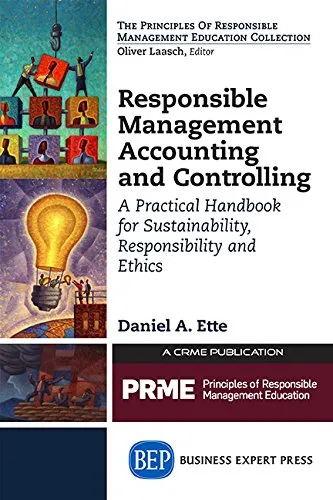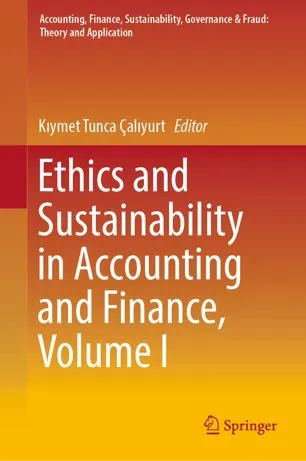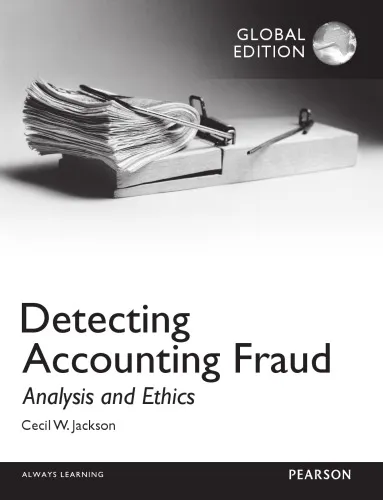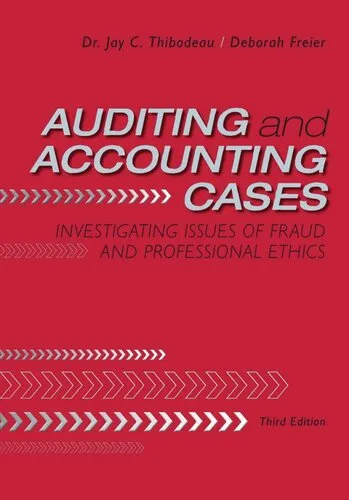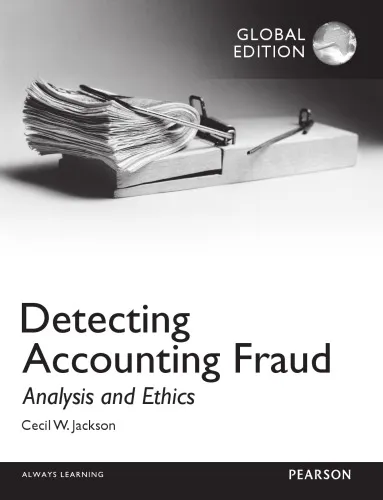The Routledge Handbook of Accounting Ethics
4.3
بر اساس نظر کاربران

شما میتونید سوالاتتون در باره کتاب رو از هوش مصنوعیش بعد از ورود بپرسید
هر دانلود یا پرسش از هوش مصنوعی 2 امتیاز لازم دارد، برای بدست آوردن امتیاز رایگان، به صفحه ی راهنمای امتیازات سر بزنید و یک سری کار ارزشمند انجام بدینکتاب های مرتبط:
معرفی اجمالی کتاب
کتاب "The Routledge Handbook of Accounting Ethics" به قلم "Eileen Z. Taylor" و "Paul F. Williams"، منبعی کامل و تخصصی در زمینه اخلاق حرفهای حسابداری است. این کتاب مفاهیم و موضوعات اخلاقی موجود در رشته حسابداری را به تفصیل بررسی میکند و به خوانندگان کمک میکند تا درک بهتری از این مباحث پیدا کنند. این کتاب برای دانشجویان، اساتید و حرفهایهای حسابداری که به دنبال ارتقای فهم خود از اصول اخلاقی هستند، بسیار مفید است.
خلاصهای از کتاب
محتویات این کتاب به بررسی تاثیرات مختلف اقتصادی، فرهنگی و اجتماعی بر اخلاق حسابداری میپردازد. از جمله موضوعاتی که در این کتاب پوشش داده میشوند، میتوان به مسئولیتپذیری در حسابداری، چالشهای اخلاقی در فعالیتهای مالی و رعایت اصول اخلاقی در میان شرکتهای حسابداری اشاره کرد. نویسندگان تلاش کردهاند تا با استناد به مطالعات اخیر، تجزیه و تحلیلهای جامعی از روندهای نوظهور در زمینه اخلاق حسابداری ارائه دهند.
نکات کلیدی
- اهمیت اصول اخلاقی در تصمیمگیری حسابداری و تاثیر آن بر جامعه.
- تجزیه و تحلیل موارد واقعی نقض اخلاق در سازمانهای مالی.
- ارائه راهکارهایی برای تقویت فرهنگ اخلاقی در حسابداران و مدیران مالی.
جملات معروف از کتاب
"اخلاق در حسابداری، پایه و اساس تصمیمگیری صحیح و قابل اعتماد است که در نهایت منجر به اعتماد عمومی میشود."
"حسابداران نه تنها مسئول اجرای قوانین هستند، بلکه باید به عنوان الگوی اخلاقی در محیط کاری خود عمل کنند."
چرا این کتاب مهم است؟
در عصری که اعتماد عمومی به نهادهای مالی به دلیل رسواییهای مالی متعدد و بحرانهای اقتصادی تضعیف شده است، فهم اخلاق حسابداری از اهمیت ویژهای برخوردار است. این کتاب با ارائه یک چارچوب جامع و عملی برای مواجهه با چالشهای اخلاقی، به مخاطبان خود کمک میکند تا در تصمیمگیریهای مالی با درایت بیشتری عمل کنند و به ارتقای سطح اعتماد عمومی کمک نمایند. همچنین، با مطالعه این کتاب، حرفهایها میتوانند بنیانهای اخلاقی قویتری در فعالیتهای روزمره خود ایجاد کنند.
Introduction to "The Routledge Handbook of Accounting Ethics"
"The Routledge Handbook of Accounting Ethics," authored by Eileen Z. Taylor and Paul F. Williams, is an essential compendium that articulates the evolving landscape of ethical standards in the field of accounting. In an era marked by rapid technological advancements, globalization, and complex financial systems, the book delves deep into the moral imperatives and responsibilities that accounting professionals face. Emphasizing both theoretical and practical perspectives, it explores the multifaceted challenges and opportunities within accounting ethics.
A Detailed Summary of the Book
The handbook presents a comprehensive discourse on the pivotal role of ethics in accounting, structured across several critical dimensions. It commences with a historical overview, tracing the evolution of ethical practices in accounting and examining influential regulatory frameworks. Through its detailed analyses, the book investigates how ethics underpin the broader objectives of financial reporting and auditing.
The authors devote significant attention to contemporary issues such as corporate governance, tax ethics, and environmental accountability. Furthermore, the book explores the impact of technology and data analytics on ethical decision-making, providing insights into both the challenges and solutions posed by these developments.
By integrating case studies, expert opinions, and regulatory perspectives, the handbook creates an interactive dialogue about real-world ethical dilemmas. It emphasizes the importance of cultivating ethical awareness and professional judgement among accountants, equipping readers with the necessary tools to navigate ethical complexities in their practice.
Key Takeaways
- Understanding the historical context of accounting ethics and its influence on current practices.
- Examining the intersection between technological advancement and ethical accounting practices.
- Developing a nuanced comprehension of ethical issues in corporate governance and financial reporting.
- Building a framework for ethical decision-making in diverse accounting scenarios.
- Recognizing the role of professional judgement and ethical standards in maintaining public trust.
Famous Quotes from the Book
"Ethics in accounting is not merely a set of theoretical principles, but a living practice that sustains trust in financial systems."
"The core of accounting ethics rests on transparency and integrity, values that form the backbone of financial stewardship."
Why This Book Matters
"The Routledge Handbook of Accounting Ethics" stands out as a vital resource for both seasoned accountants and those new to the profession. It contributes significantly to the ongoing dialogue about the role of ethics in shaping a trustworthy financial ecosystem. By tackling some of the most pressing ethical challenges of our time, the book encourages accountants to become conscientious stewards of financial information.
Its relevance is heightened in today’s world where the repercussions of financial misconduct are far-reaching and severe. Through insightful exploration and practical guidance, Taylor and Williams offer an indispensable roadmap for integrating ethical principles into everyday accounting practices. Ultimately, this handbook empowers professionals to uphold the highest ethical standards, fostering greater confidence in financial systems worldwide.
دانلود رایگان مستقیم
شما میتونید سوالاتتون در باره کتاب رو از هوش مصنوعیش بعد از ورود بپرسید
دسترسی به کتابها از طریق پلتفرمهای قانونی و کتابخانههای عمومی نه تنها از حقوق نویسندگان و ناشران حمایت میکند، بلکه به پایداری فرهنگ کتابخوانی نیز کمک میرساند. پیش از دانلود، لحظهای به بررسی این گزینهها فکر کنید.
این کتاب رو در پلتفرم های دیگه ببینید
WorldCat به شما کمک میکنه تا کتاب ها رو در کتابخانه های سراسر دنیا پیدا کنید
امتیازها، نظرات تخصصی و صحبت ها درباره کتاب را در Goodreads ببینید
کتابهای کمیاب یا دست دوم را در AbeBooks پیدا کنید و بخرید
1288
بازدید4.3
امتیاز0
نظر98%
رضایتنظرات:
4.3
بر اساس 0 نظر کاربران
Questions & Answers
Ask questions about this book or help others by answering
No questions yet. Be the first to ask!
